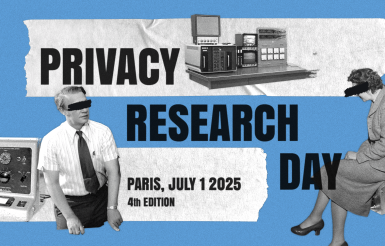Privacy Research Day 2024: Watch the replay
20 June 2024
The CNIL presents its third edition of the Privacy Research Day organized on June 4, 2024 in Paris. During this multidisciplinary and international event, researchers will present their work. Discover the program and register below.

Third edition of a major academic conference on data protection
This third edition of the Privacy Research Day will provide an opportunity to strengthen links between the academic world and regulators. Providing an opportunity for unprecedented exchanges between legal experts, IT specialists, designers, economists and social science researchers, this day is aimed at a wide audience familiar with privacy and data protection.
Designed as a forum for exchange and encounters, the Privacy Research Day is also an opportunity to build lasting partnerships between the world of research, the CNIL and other public bodies.
Watch the replay
Morning
Afternoon
The program
9 h – 9 h 15
Greetings by Marie-Laure DENIS, Chair of the CNIL
9 h 15 – 10 h 20
Panel 1 : Strategies for Ai regulation
Moderator : Claude CASTELLUCCIA, director of research at Inria Grenoble and CNIL commissioner
- Anna POPOWICZ-PAZDEJ (University of Wroclaw, Poland)- Why the generative AI models do not like the right to be forgotten: a study of proportionality of identified limitations – Law
- Adrien RAIZONVILLE (Institut Polytechnique de Paris, France)- From black box to glass box: algorithmic explainability as a strategic decision – Economy
- Benoit ROTTEMBOURG (Inria Paris-Rocquencourt, France) - Auditer l’équité : l’union fait-elle la force ? (Auditing fairness: does strength come through unity?) – Math/Computer science
10 h 20 – 11 h 25
Panel 2 : Security and privacy, from best practices to reality
Moderator : Fabien TARISSAN, researcher at the CNRS and CNIL commissioner
- Aurélien BELLET (Inria, Université de Montpellier, France) - Auditing privacy in machine learning with attacks and zero-knowledge proof - Computer science
- Narseo VALLINA-RODRIGUEZ (IMDEA Networks Institute, AppCensus, Spain) - In the Room Where It Happens: Characterizing Local Communication and Threats in Smart Homes - Computer science
- Yixin ZOU (Max Planck Institute, Germany) - Nudging Users to Change Breached Passwords Using the Protection Motivation Theory - Design
11 h 25 – 11 h 40
Break
11 h 40 – 12 h 45
Panel 3 : User’s perspective on risk and information
Moderator : Limor SHMERLING MAGAZANIK, OECD Policy Analyst, Privacy, Data Governance and Digital Security
- Victor LE POCHAT (KU Leuven, Belgium) - Swipe Left for Identity Theft: An Analysis of User Data Privacy Risks on Location-based Dating Apps - Computer science
- Xengie DOAN (Université du Luxembourg, Luxembourg) - Analysis of Transparency and User-relevancy of DTC Company Policies - Design & Law
- Klaus MILLER (HEC Paris, France) - Using the Dual-Privacy Framework to Understand Consumers’ Perceived Privacy Violations Under Different Firm Practices in Online Advertising - Marketing
12 h 45 – 14 h 00
Lunch break
14 h 00 – 15 h 05
Panel 4 : Vulnerable populations
Moderator : Lucien CASTEX, member of l'Association française pour le nommage Internet en coopération (Afnic, French Association for Cooperative Internet Naming)
- Isabelle BERREBI-HOFFMANN (CNAM, France) and Elise HAUTIN - The right to privacy of children in care - A vulnerable public at the crossroads of legal issues, institutional injunctions and varied practices, as interpreted by field workers - Sociology
- Yann BRUNA (Université Paris Nanterre, France) - Monitoring and proving: the evidentiary purposes of location-based platforms social surveillance - Sociology
- Miranda WEI (University of Washington, USA) - Understanding Help-Seeking & Help-Giving on Social Media for Image-Based Sexual Abuse - Computer science
15 h 05 – 15 h 15
Break
15 h 15 – 16 h 20
Panel 5 : Children advertising and tracking
Moderator : Benoit LOUTREL, member of l'Autorité de régulation de la communication audiovisuelle et numérique (Arcom, French regulatory authority for audiovisual and digital communication)
- Oana GOGA (LIX, CNRS, France) - Marketing to Children Through Online Targeted Advertising: Targeting Mechanisms and Legal Aspects - Law & computer science
- Zahra MOTI (Radboud University, Pays-Bas) - Targeted and Troublesome: Tracking and Advertising on Children’s Websites - Computer science
- Kaiwen SUN (University of Michigan, USA) - Unfulfilled Promises of Child Safety and Privacy: Portrayals and Use of Children in Smart Home Marketing - Design
16 h 20 – 17 h 25
Panel 6 : Personal data in the digital economy
Moderator : Aymeric PONTVIANNE, Head of the Economic Analysis Mission of the CNIL
- Doh-Shin JEON (Toulouse School of Economics, France) - Data Combination and the Supply of Privacy-Protecting Apps: On the role of Data Complementarities and Data Externalities - Economy
- Timo MÜLLER-TRIBBENSEE (Goethe University Frankfurt, Germany) - Paying for Privacy: Pay-or-Tracking Walls - Economy
- Reinhold KESLER (University of Zurich, Swittzerland) - Existence, Antecedents and Consequences of Non-Compliance in Mobile App Markets - Economy
17 h 30
Concluding speech - Fabien TARISSAN, CNIL commissioner



